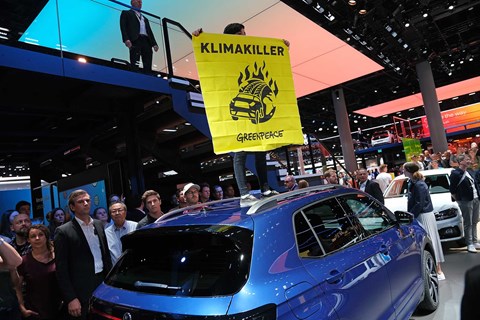► What future for motor shows?
► Virus kills 2020’s crop of expos
► But will they ever return?
Are the days of the traditional motor show numbered? Last autumn’s Frankfurt motor show – traditionally the biggest and most bumptious of the lot – was a shell of its former self, with plenty of manufacturers giving it a wide berth, protests by environmentalists and a collapse in attendance numbers. The show was subsequently axed.
The global coronavirus pandemic saw off all the major shows in 2020: first the Geneva motor show stuttered then folded in March, followed by New York’s auto show in April and the rest of the year’s major automotive shows toppled like dominoes in the wake of Covid-19. The Paris motor show is currently on hold and will not be held ‘in its current format’ this September.
Will any of them return? The show organisers claim so, and are planning to either switch dates or treat 2020 as a fallow year. But many manufacturers, bridling at the multi-million pound cost of attending, have other ideas…
When even the Frankfurt show wobbles, there is a problem
It would once have seemed inconceivable that the mighty German car industry couldn’t support its own biennial flagship, but Frankfurt’s Internationale Automobil Ausstellung (or IAA, for short) has gone the way of the Earls Court and NEC British motor shows after numbers fell and manufacturers stopped attending.

Even though Frankfurt was attended by half a million visitors last year, manufacturers no longer see footfall as active in-market car buyers.
| Year |
IAA attendance |
| 2005 |
940,000 |
| 2007 |
1,000,000 |
| 2009 |
850,000 |
| 2011 |
928,000 |
| 2013 |
900,000 |
| 2015 |
932,000 |
| 2017 |
810,000 |
| 2019 |
500,000 |
Bernhard Mattes, the previous head of the VDA German car lobby, admitted he couldn’t commit to the status quo in Frankfurt. ‘We have made several changes already – it’s not about how many cars, how many visitors, how many square metres,’ he said. ‘First we have to agree on a fresh concept, then decide in which city to display this best,’ he told reporters, as he unexpectedly quit.
His departure was hastened by a dramatic fall in attendance to half what it was two decades ago. Times change and the days of trudging around a giant industrial complex to eyeball your four-wheeled shopping list are over, it seems.
Frankfurt has hosted the IAA since 1951 but the German industry is now pinning its hopes on a new event in Munich from autumn 2021.
What are car manufacturers doing instead of motor shows?
When even top-tier events in Geneva and Frankfurt suffer an exodus of car brands, it’s clear that the traditional motor show is in serious decline. One well known car manufacturer board member confided that a typical mainstream player would budget around £50 million a year on motor shows if they attended all the majors. ‘They clobber you three times: once for the hallspace, once for the build and once for the staffing…’

No wonder brands are reassessing their spend. Manufacturers like Ford are reallocating show budgets on new standalone marketing messages they can more easily control away from the hubbub of the world stage. More upmarket and immersive catwalks like Goodwood and Pebble Beach have grown in popularity and the (equally pricey) investment in online configurators and augmented reality tools coming soon bring the motor show experience to your front room.
As with so many things in life, digital trickery has trumped old-school razzmatazz.
Do motor shows have a viable future? Sound off in the comments below